(6) Environment and Climate Change Actions
The importance of initiatives to address environmental and climate change issues is recognized globally, as such issues have been repeatedly taken up as one of the main topics at the G7 and G20 Summits and are also mentioned in the SDGs adopted at the UN Summit in 2015. Japan has been vigorously working on addressing these issues and has also been providing assistance to developing countries through the Global Environment Facility (GEF)*, a financing mechanism for major international environmental treaties such as the Convention on Biological Diversity and United Nations Framework Convention on Climate Change, as the world’s top donor. Japan will continue to actively participate in discussions in the international community.
●Japan’s Efforts
... Conservation of the Marine Environment
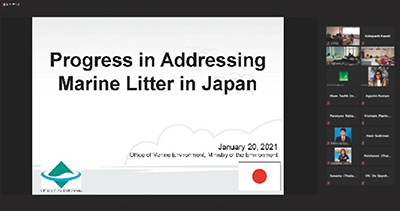
An online training to learn research and analytical methods on marine plastic litter, including microplastics
Marine plastic litter is a pressing issue that can have an adverse impact on the marine ecosystem, tourism, fisheries, and human health. In recent years, measures to address this issue have become increasingly important. At the G20 Osaka Summit in June 2019, under Japan’s leadership as the G20 Presidency, the member countries shared the Osaka Blue Ocean Vision, which aims to reduce additional pollution by marine plastic litter to zero by 2050 and has now been shared by 86 countries and regions as of December 2020. In order to achieve the Vision, Japan announced that it would support capacity building, infrastructure development for waste management in developing countries, and launched the MARINE Initiative that focuses on (i) MAnagement of wastes, (ii) Recovery of marine litter, (iii) INnovation, and (iv) Empowerment, to encourage effective marine plastic litter measures worldwide. Under the Initiative, Japan continues to support capacity building in developing countries to promote waste management, collection of marine waste, and innovation through specific measures.
In 2018 and 2019, Japan contributed approximately ¥2.84 billion in support through international organizations including the United Nations Environment Programme (UNEP) in order to build scientific knowledge and develop capacities for measures against marine plastic litter in the Asia region. The CounterMEASURE I and II projects by UNEP’s Regional Office for Asia and the Pacific have conducted awareness activities for local people and developed a method for monitoring the flow of plastic into the ocean in the lower Mekong River basin on the Indochinese Peninsula as well as the Southwest Asia region. In developing the method, the technology of Japanese companies that detects areas of plastic pollution was used to identify 886 “hotspots” with high risks for plastic leakage. Through the project, approximately 1,692 kg of plastic have been collected, approximately 823 kg of plastic have been analyzed for research, and the number of participants in awareness and cleanup activities has climbed to approximately 4,690 up until now.
Furthermore, based on the G20 Implementation Framework for Actions on Marine Plastic Litter adopted at the G20 Ministerial Meeting on Energy Transitions and Global Environment for Sustainable Growth in 2019, Japan has assisted in compiling the “G20 Report on Actions against Marine Plastic Litter: Second Information Sharing based on the G20 Implementation Framework” at the 2020 G20 Environment Ministers’ Meeting and under Saudi Arabia’s initiative.
Moreover, as part of expanding assistance for ASEAN concerning marine plastic litter that was announced at the Japan-ASEAN Summit Meeting in November 2018, Japan is providing trainings in Japan on survey and analysis methods on marine plastic litter, including microplastics. The training was conducted virtually in January 2021 with a total of 17 attendees, including five from Indonesia and four each from Myanmar, Thailand, and Viet Nam.
In addition, Japan is conducting human resources development as well as awareness and public relation activities for environmental conservation centered on reducing marine plastic litter in ASEAN countries. For example, with contributions to the Japan-ASEAN Integration Fund (JAIF) and through various organizations such as the Ministry of Natural Resources and Environment of Viet Nam, NHK International, Inc., and the Institute for Global Environmental Strategies (IGES), Japan is providing assistance for the formulation of national action plans for ASEAN member states, regional collaborative research and capacity building for the monitoring and reduction of marine debris from fisheries in Southeast Asia, documentary video production on marine plastic waste, and the implementation of the 2019 Bangkok Declaration on Combating Marine Debris. Furthermore, at the Eighth Japan-China-ROK Trilateral Summit held in December 2019, Japan, China, and the Republic of Korea affirmed that they would support and promote joint efforts to handle issues of common interest including marine plastic litter.
... Conservation of Ocean Resources
Japan backs sustainable fishing and the sustainable development of fishing communities within the ASEAN region, and hence is conducting trainings and workshops on countermeasures against illegal, unreported, and unregulated (IUU) fishing through JICA and with the cooperation of the Southeast Asian Fisheries Development Center (SEADEC). Curbing the impact on fish ecosystems by IUU fishing that exceeds regulatory thresholds will lead to enhanced sustainability of the fishing industry, one of the core industries for ASEAN countries.
... Climate Change
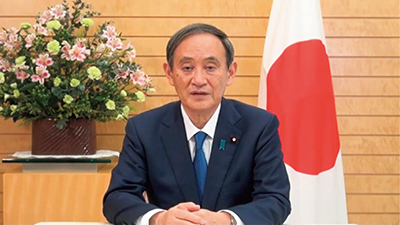
A video message by Prime Minister Suga played at the Climate Ambition Summit 2020 (December 2020)
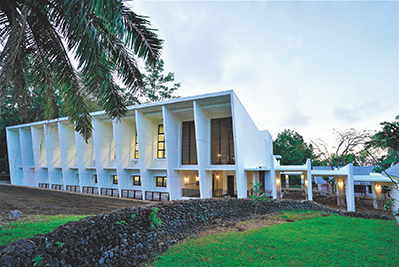
The Pacific Climate Change Centre in Samoa, which serves as base for the work of Pacific island countries against climate change (Photo: JICA)
Climate change is a global issue that requires a cross-border approach, and strengthening concerted efforts by the international community including both developed and developing countries is needed. Given the fact that the Kyoto Protocol adopted in 1997 imposed the obligations of reducing greenhouse gas (GHG) emissions only on developed countries, the Paris Agreement was adopted at the 21st Session of the Conference of the Parties to the UN Framework Convention on Climate Change (COP21), held in Paris in 2015, as a new framework under which all countries would work toward GHG emission reductions. The Paris Agreement entered into force in 2016. Although COP26, which had been scheduled to be held in Glasgow, the UK in November 2020, was postponed to November 2021 due to the impact of COVID-19, discussions have continued on topics such as the adoption of implementation guidelines for market mechanisms.
In March 2020, Japan submitted its Nationally Determined Contribution (NDC) Note 40 to the UN and announced that reviews of the reduction targets in the NDC would be carried out consistently with revisions of the energy mix, aiming at aspiring figures to reflect further ambitious efforts.
Additionally, in his policy speech to the Diet in October 2020, Prime Minister Suga declared that by 2050, Japan will aim to reduce greenhouse emissions to net-zero, that is, to realize a carbon-neutral, decarbonized society to devote itself to the greatest possible extent to bring about a green society, while focusing on a virtuous cycle of the economy and the environment as a pillar of Japan’s growth strategy. He also noted that addressing climate change is no longer a constraint on economic growth and paradigm shift is needed to a mindset that proactive climate change measures bring transformation of industrial structures as well as the economy and society, leading to dynamic economic growth. In addition to a sincere welcome and appreciation for this courageous decision expressed by UN Secretary-General Guterres, the policy was met with high acclaim by the international community, including Chile, COP25 President, and the UK, COP26 President.
On December 12, 2020, the Climate Ambition Summit 2020 was co-hosted by the UK, France, and the UN in partnership with Chile and Italy as a summit-level event. This summit aimed to commemorate the fifth anniversary of the adoption of the Paris Agreement and to call for the international community’s further efforts against climate change. Leaders from 75 countries and regions, international organizations, global companies, NGOs, and youth groups participated, with Prime Minister Suga attending from Japan. In his video message, Prime Minister Suga spoke of Japan’s efforts in aiming to achieve a carbon-neutral society by 2050.
Moreover, Japan is actively supporting climate change actions in developing countries. In 2015, Japan announced the provision of approximately ¥1.3 trillion in 2020 in aid from public and private funds in order to support developing countries in addressing climate change, and is steadily working toward reaching that goal.
As a specific example of bilateral aid, Japan supported the establishment of the Pacific Climate Change Centre in Samoa to which Japan is dispatching experts on climate change countermeasures. Through the Centre, Japan is striving to develop human resources in the Pacific island countries vulnerable to climate change. Additionally, in Tonga, Japan assisted in installing a wind power generation system with tiltable wind turbines and other machinery to support electricity supply that is resilient to natural disaster, promoting the introduction of renewable energy and contributing to its stable energy supply in the country.
As part of its assistance for measures against climate change in developing countries, Japan is promoting the “Joint Crediting Mechanism (JCM),”* which facilitates the global application of advanced low-carbon and decarbonized technologies to the world including to developing countries. This will contribute to GHG emission reductions in developing countries and enable the bilateral sharing of the results. In 2013, Japan signed the first bilateral document pertaining to the JCM implementation with Mongolia, and to date, it has established the JCM with 17 countries. As of the end of 2020, the JCM credits have been issued from 37 energy-saving and renewable energy projects in Cambodia, Indonesia, Laos, the Maldives, Mongolia, Palau, Saudi Arabia, Thailand, and Viet Nam. These JCM projects are contributing to GHG emission reductions worldwide.
With regard to export support for coal-fired power generation projects, in 2020, Japan tightened its export policy for assistance for newly planned projects from the perspective of engaging responsibly in the world’s effective decarbonization. Japan will deepen its involvement in the partner country’s energy and climate change policy, leading the realization of a decarbonized society.
Furthermore, Japan supports developing countries through its contribution to the Green Climate Fund (GCF)*, the world’s largest multilateral climate fund. Japan has pledged up to $3 billion to the fund, putting effort into its support for countries vulnerable to the impacts of climate change as the fund’s second largest donor country. In the GCF, a total of 159 projects have been approved by December 2020, with a large number of them entering the implementation phase, which in total are expected to reduce GHG emissions by 1.2 billion tons and benefit 410 million people through support for adaptation measures. Additionally, from Japan, JICA and MUFG Bank have been approved as “Accredited Entities” that are entitled to develop GCF projects, and to date, two projects by MUFG Bank have been adopted (construction of solar power and pumped-storage hydroelectricity facilities in Chile (July 2019) and support for sustainable private forestry projects in seven countries in Sub-Saharan and South American region (March 2020)).
Solomon
Project for Capacity Development for Sustainable Forest Resource Management in Solomon Islands
Technical Cooperation Project (September 2017 – August 2022)
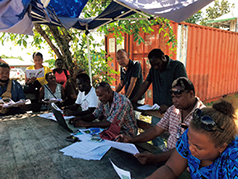
A project meeting led by officials of the Ministry of Forestry and Research (Photo: JICA)
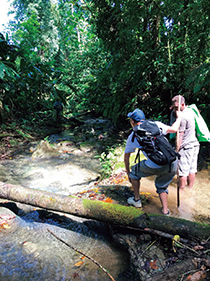
As a part of the pilot activities, a JICA expert instructing a local resident on community boundary demarcation (Photo: JICA)
Approximately 90% of the national land of Solomon is covered by forest (as of 2020). The forestry industry is one of the major industries, and revenues from the export of timber (mainly logs) account for approximately 65% of foreign currency earnings. In recent years, export volume has also been increasing in response to growing demand for timber in the Asian region.
This has raised concerns about the depletion of forest resources and forest degradation caused by large-scale commercial logging. For example, in the 10 years from 2000 to 2010, it is said that the canopy cover, which is the area of branches and leaves of the upper parts of trees, decreased by more than 20% on approximately 160,000 hectares of forests. In addition, since the majority of the forests are privately owned, it is important to promote the sustainable use of forest resources and raise the awareness of local residents about the danger of forest degradation.
Under these circumstances, this project is supporting the strengthening of the capacity of the Ministry of Forestry and Research for sustainable forestry.
Project experts are working closely with the Ministry of Forestry and Research to provide technical support for forest policy and forestry information management promoted by the ministry, as well as support to improve the coordination and leadership capabilities of the ministry’s officials. In addition, through pilot activities with the participation of local residents, their awareness and ownership regarding the sustainable use of forests and forest lands have improved, and as a result, a way of life that is not too dependent on forest resources is gradually being realized.
Furthermore, in cooperation with the Ministry of Forestry and Research, the project is playing a central role in coordinating with supporting organizations working in the forest sector by operating the Secretariat of the Forest Sector Technical Working Group. In this way, Japan’s cooperation is contributing to the forestry policy in Solomon and is having significant inputs on the sustainable use of forest resources.
... Biodiversity
Expansion in the types, scope, and scale of human activities has given rise to serious concerns about further degradation of habitats and the destruction of the ecosystem in recent years. Japan places importance on biodiversity initiatives, such as hosting the 10th Meeting of the Conference of the Parties to the Convention on Biological Diversity* (COP10) in Nagoya City, Aichi Prefecture in October 2010. With the aim of providing support for measures such as the capacity development of developing countries toward the achievement of the Aichi Biodiversity Targets*, Japan contributes to the “Japan Biodiversity Fund,”* through which the Secretariat of the Convention organizes workshops to support the implementation of the National Biodiversity Strategies and Action Plans. In addition, as part of the process of formulating the Post-2020 Global Biodiversity Framework, including the next global goals that will replace the Aichi Biodiversity Targets, the Open-ended Working Group and other meetings have been held, during which Japan also participated in and contributed to the discussions.
In recent years, illegal trade in wildlife has become an increasingly serious issue. It is also drawing the attention of the international community as one of the sources of funding for international terrorist organizations. Along with actively participating in the discussions at the Convention on International Trade in Endangered Species of Wild Fauna and Flora (CITES), Japan works on resolving these issues in cooperation with the international community through contributing to projects implemented by the CITIES Secretariat. Specifically, Japan has supported the construction of facilities for implementing elephant poaching countermeasures among other initiatives.
... Environmental Pollution Control Measures
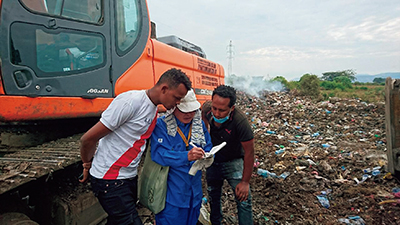
Dr. MATSUFUJI Yasushi, Professor Emeritus at Fukuoka University and developer of the “Fukuoka method,” providing on-site guidance in a project supporting urban waste management (through UN-HABITAT) in Ethiopia, one of the ACCP’s initiatives
In developing countries, regulatory controls on hazardous chemical materials are often not in place, and sometimes lead to environmental pollution and damage to health. Japan has accumulated abundant knowledge, experience, and technology related to environmental pollution control measures and has been utilizing them to solve environmental pollution problems in developing countries. Japan has also been conducting technical cooperation in the chemical industry, such as dispatching experts to developing countries and accepting trainees from them, including in the areas of environmental management techniques, analysis techniques and risk evaluation for environmentally hazardous substances, and trace chemical analysis techniques.
At the Conference of Plenipotentiaries on the Minamata Convention on Mercury held in Japan in 2013, Japan took the lead in the adoption of the “Minamata Convention on Mercury” as the President, and this Convention entered into force in August 2017. Japan is exercising continuous leadership in promoting the management of global mercury pollution by proactively transferring to the world its technology and know-how on preventing adverse effects caused by mercury, accumulated through its experience with the Minamata disease Note 41. In December 2020, Japan, among other things, held an online training regarding the management of mercury for ten countries with UNEP-ROAP as the implementing institution in order to provide support for developing countries.
Moreover, in the field of waste management, based on the “MARINE Initiative,” in addition to providing training for 10,000 officials engaging in waste management around the world by 2025 Japan held the 10th Regional 3R and Circular Economy Forum in Asia and the Pacific jointly with the United Nations Centre for Regional Development (UNCRD) as a webinar series over six sessions from November to December 2020. During the Forum, various countries shared information on systematic and technological aspects useful for the promotion of 3R Note 42 and the circular economy in the Asia-Pacific region, and as the outcome document, the “State of Plastics Waste in Asia and the -Pacific- Issues, Challenges and Circular Economic Opportunities” report summarizing the overview of waste issues in the Asia-Pacific region was adopted.
In November 2020, Japan also signed an Exchange of Notes with Cambodia on the “Project for Combating Marine Plastic Litter.” In cooperation with the United Nations Development Programme (UNDP), the project will promote 4R (Refuse, Reduce, Reuse, Recycle) and carry out operations to raise awareness of waste disposal among residents and corporations. By aiming to improve the environments of urban areas and to reduce the amount of plastic waste discharged into the ocean through the Mekong River, the project is expected to improve the urban living environments for Cambodia’s citizens and contribute to Goal 14 of the SDGs, “Life Below Water.”
Moreover, as a model project for waste management support in Africa under the African Clean Cities Platform (ACCP)*, Japan has provided support for the Hulene final waste dumping site in Mozambique. Following an accident in which a waste pile collapsed due to heavy rains, Japan has supported the prevention of further collapse and future safety measures by applying the “Fukuoka method” at the dumping site through pilot construction utilizing counterpart funds and on-site guidance by experts. This “Fukuoka” method was developed by Japan and is being introduced in waste dumping sites around the world, such as Asia and Africa. The first construction for safety measures, which began in 2019, was completed in October 2020.
- *Global Environment Facility (GEF)
- A multilateral funding mechanism providing primarily grant-based financing for projects that contribute to global environmental conservation in developing countries. Established in 1991, 183 countries including Japan participate (as of June 2020). The World Bank acts as trustee. Through 18 implementing organizations including MDBs (World Bank, ADB, etc.) and UN organizations (UNDP, UNEP, etc.), it assists in the five areas of biodiversity conservation, measures against climate change, pollution prevention in international waters, measures against land degradation, and measures against chemicals and waste.
It is designated as the financing mechanism to five international conventions: United Nations Framework Convention on Climate Change, Convention on Biological Diversity, UN Convention to Combat Desertification, Stockholm Convention on Persistent Organic Pollutants, and Minamata Convention on Mercury. - *Joint Crediting Mechanism (JCM)
- A mechanism to evaluate contributions by Japan for GHG emission reductions or removals in a quantitative manner through the provision of advanced decarbonized technologies, products, systems, services, and infrastructure to developing countries and through the implementation of greenhouse gas reduction projects, and to utilize the achieved reductions as “credit” to achieve Japan’s emission reduction target.
- *Green Climate Fund (GCF)
- A multilateral climate fund established by the decision of the Cancun Agreements adopted at COP16 in 2010, in order to support developing countries in reducing/sequestering their greenhouse gases (mitigation) and enhancing their ability to respond to climate change (adaptation).
- *Convention on Biological Diversity (CBD)
- A convention adopted in 1992 to advance efforts to address biodiversity issues on a global scale. The objectives of the CBD are the following: (i) conservation of biological diversity, (ii) sustainable use of the components of biological diversity (utilizing living things, etc. for resources into the future while maintaining diversity at the levels of ecosystems, species, and genes), and (iii) fair and equitable sharing of the benefits arising from the utilization of genetic resources. Through the provision of economic and technical assistance to developing countries from developed countries, the international community as a whole facilitates the conservation and sustainable use of biological diversity worldwide.
- *Aichi Biodiversity Targets (The Strategic Plan for Biodiversity 2011 - 2020)
- Aichi Biodiversity Targets were set out in the Strategic Plan for Biodiversity 2011 - 2020 of the CBD adopted at COP10 in 2010. It sets a goal to realize “Living in Harmony with Nature” by 2050 and established 20 individual short-term targets called the “Aichi Biodiversity Targets” in order to implement actions to halt the loss of biodiversity by 2020.
- *Japan Biodiversity Fund
- A fund established in the Secretariat of the CBD by Japan during its COP10 Presidency with the aim of cultivating capacities in developing countries for the achievement of the Aichi Biodiversity Targets. Japan contributed a total of ¥5 billion in FY2010 and FY2011.
- *African Clean Cities Platform (ACCP)
- Established in April 2017 by the Ministry of the Environment together with JICA, the City of Yokohama, UNEP, and the UN Human Settlement Programme (UN-Habitat) aiming to share knowledge on waste management and promote the achievement of the SDGs in Africa. 65 cities in 37 countries in Africa have joined, holding plenary sessions, creating various guidelines and educational materials, planning study tours, and more.
- Note 40: Parties set their greenhouse gas emission reduction targets and formulate measures to achieve them, which are submitted as their Nationally Determined Contribution (NDC) to the United Nations Framework Convention on Climate Change (UNFCCC) secretariat.
- Note 41: Minamata disease is a toxic nervous disorder caused by ingesting fish and shellfish contaminated with methylmercury compounds discharged from chemical plants. The disease was officially acknowledged in May 1956 in and around Minamata Bay area in Kumamoto Prefecture, and in May 1965 in the Agano River basin of Niigata Prefecture.
- Note 42: A term referring to the first letter of Reduce (reduce waste), Reuse, and Recycle.
